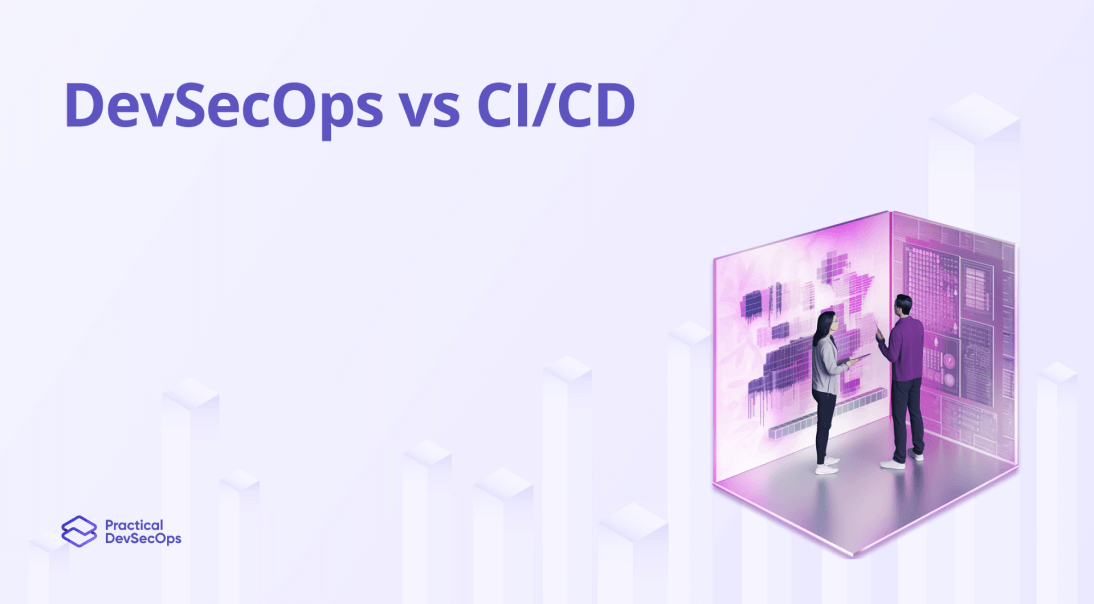In today’s fast-paced software development landscape, organizations strive to deliver new features and updates rapidly. However, this need for speed should not compromise the security of applications. Two methodologies that address this challenge are DevSecOps and CI/CD. In this article, we will explore DevSecOps vs CI/CD and how they contribute to a robust and secure software development lifecycle.
DevSecOps vs CI/CD: A Comparison
DevSecOps and CI/CD are two methodologies that focus on enhancing security and agility in software development. DevSecOps integrates security throughout the SDLC, while CI/CD streamlines development through automation. The following table compares key aspects of DevSecOps and CI/CD:
| Aspect | DevSecOps | CI/CD |
| Focus | Integration of security throughout the development process | Automation and rapid delivery of software updates |
| Collaboration | Collaboration and shared responsibility among teams | Collaborative work but with less emphasis on shared responsibility |
| Security Integration | Early integration of security practices and automation | Automation of integration, testing, and deployment processes |
| Benefits | Proactive security, reduced vulnerabilities | Efficiency, faster time-to-market, and rapid software delivery |
| Automation | Automated security controls and tooling | Automated testing, build, and deployment processes |
Also Read, Best DevSecOps Tools
DevSecOps
DevSecOps, a combination of Development, Security, and Operations, emphasizes the integration of security throughout the entire software development process. It strives to ensure that security is not an afterthought but an integral part of the development pipeline.
Key Characteristics and Benefits
- Collaboration: DevSecOps fosters a culture of collaboration and shared responsibility among development, security, and operations teams. This helps create a security-oriented mindset and promotes seamless communication and cooperation.
- Shift-Left Security: In DevSecOps, security is introduced early in the development process. Security planning, threat modeling, secure coding practices, and automated security tests become an inherent part of the workflow. This approach helps identify and fix vulnerabilities at an early stage, reducing the likelihood of security incidents.
- Automation: Automation is a core principle of DevSecOps. Security controls, such as vulnerability scanning, code analysis, compliance checks, and security testing, are automated and integrated into the development pipeline. This ensures that security measures are consistently applied throughout the software development lifecycle.
Also Read, Best Books on DevSecOps
CI/CD: Continuous Integration and Continuous Deployment
CI/CD, short for Continuous Integration and Continuous Deployment, is a software development approach that focuses on automation and frequent delivery of application updates. It enables developers to work in smaller, manageable increments rather than lengthy, monolithic codebases.
Key Characteristics and Benefits
- Rapid Iteration: CI/CD allows for frequent integration and testing of code changes in a shared repository. This enables faster detection and resolution of issues as developers can identify problems early on and iterate rapidly.
- Automated Testing: Automated testing is a critical aspect of CI/CD, ensuring that code changes are thoroughly tested to maintain software quality standards. Automated tests reduce the risk of introducing bugs or breaking existing functionality.
- Efficient Deployment: CI/CD streamlines the deployment process by automating the release and deployment of tested code changes into production environments. This leads to faster time-to-market, as developers can deliver updates regularly and efficiently.
Conclusion
DevSecOps and CI/CD are key for secure and agile software development. DevSecOps integrates security throughout the process, while CI/CD automates updates for quicker delivery. Combining them ensures a secure and efficient development cycle, minimizing vulnerabilities. Embracing these practices navigates modern software challenges, fostering secure innovation.
Interested in upskilling your team in DevSecOps?
Practical DevSecOps offers an excellent Certified DevSecOps Professional (CDP) course with hands-on training through browser-based labs, 24/7 instructor support, and the best learning resources to upskill in DevSecOps skills.
Start your team’s journey mastering DevSecOps today with Practical DevSecOps!
Also read, Why DevSecOps is a Good Career Option?







0 Comments